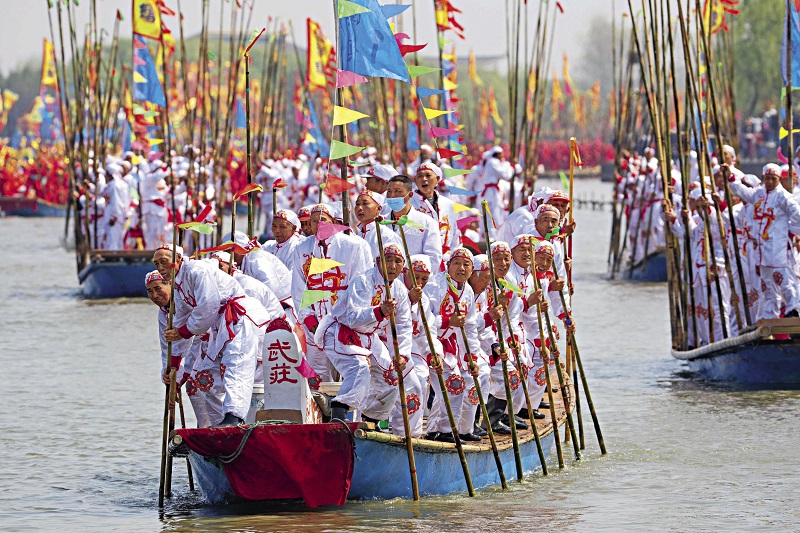
Boats filled with exuberant locals race across the waters as the 2021 Qintong Boat Festival is kicked off at Qinhu National Wetland Park in Jiangyan District, Taizhou City in east China’s province of Jiangsu on April 8, 2021.
On the second day of China’s Qingming Festival, the entire community in Qintong Town, Jiangyan District, Taizhou City, east China’s Jiangsu Province immerse themselves with a boating obsession.
The Qingming Festival observed in April every year is a day for the Chinese people to pay respect to their ancestors. Traditions related to its commemoration differ greatly among various regions. In Qintong Town, the Qintong Boat Festival is held on the second day of the Qingming Festival. Every year, hundreds of boats and tens of thousands of rowers gather for this spectacular folk gala.
Qintong and its neighboring areas lie in the Lixia River basin where pole-propelled boats are among the most common modes of transport for communities. Naturally, these boats play a leading role in local festive events. In 1998, this ancient tradition was included in China’s top 10 traditional folk culture tourism festivals by the National Tourism Administration. And in 2008, it was included in the second batch of national intangible cultural heritage.
The origins of the Qintong Boat Festival can be traced back to the Southern Song Dynasty (1127–1279). According to historical records, in the Qinhu Lake, the Southern Song Dynasty’s famous general, Yue Fei, mounted several successful defenses against the Jin invaders from the north. The fierce battles resulted in heavy casualties for the Song force. Since then, every year on the second day of Qingming, local residents pay tribute to the unmarked graves of the fallen soldiers, praying those heroes’ souls rest in peace and the descendants live happily ever after. Over time, visiting unclaimed graves became a token of good luck, so people competed to be the first boat to arrive at the graveyard. As time went by, the custom gradually evolved into a boat festival.
Today every year on the second day of Qingming, more than 500 boats from nearby villages and towns, along with over 10,000 boatmen and tens of thousands of spectators gather in Qintong to celebrate the boat festival. The participating boats can be categorized generally into four types: tribute boats, pole boats, dragon boats, and paddle boats.
In bright colors and various shapes, the tribute boats embody the finest arts and crafts of the Qintong region. The display session for tribute boats is like a beauty pageant, and even from a distance the audience can sense its strong significance.
The pole boat is the centerpiece of the boat meeting. The lineup of boats is a tradition going back centuries with 12 people standing on each side, and each person holding a pole in hand. Techniques are also required when it comes to selecting poles. The pole should be straight, about five meters in length, and of even thickness, and easy to hold so as to ensure speed and power when rowing.
The pole boats are followed by dragon boats, an auspicious symbol of adequate and timely winds and rains as well as a good harvests of grains. There are dragon dance performances on deck. Those “dragons” in various colors move smoothly up and down from left to right, creating a spectacular scene of dragons marching vigorously.
The paddle boat parade is another unique highlight, and features female rowers. In the past, women were not allowed on the boats during the festival, but now this tradition has been scrapped and women can also participate in this big celebration.
On the day of boat racing, the Qinhu Lake is transformed into a boisterous racetrack. Colorful banners and flags flutter in the air, accompanied by pounding drums and lively music. Tens of thousands of people line the bank, hoping to get a glimpse of the boating event. Participating boats spread out across the lake, carrying thousands of poles, looking like a forest from a distance. Synchronized to the sound of gongs and drums, hundreds of boats rush out and race towards the finishing line. It is a festive party featuring time-honored rituals and fond wishes for a better future.